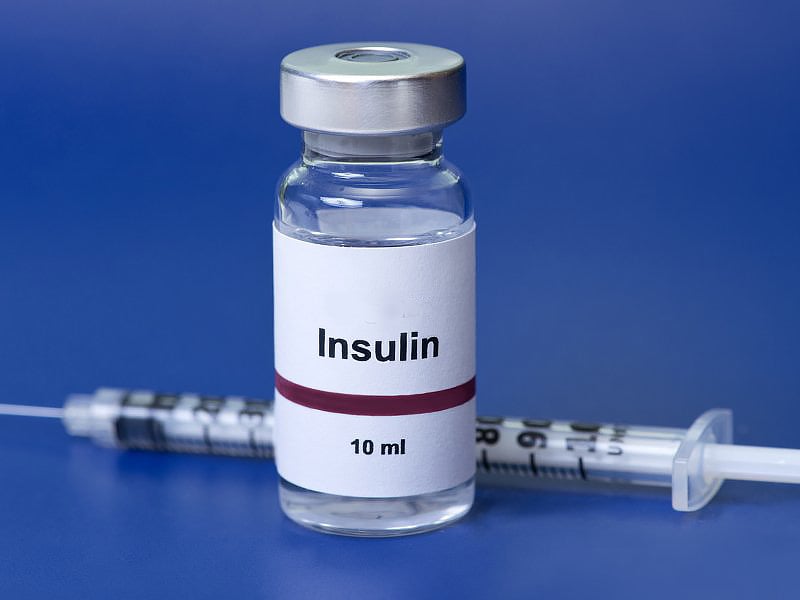When diabetics inject insulin.
Where injected diabetics with insulin to regulate their blood sugar levels in the blood.What is insulin?
Insulin is a hormone that is called by a member behind the stomach is made pancreas. Here insulin into the blood by specialized cells called beta cells in areas of the pancreas called the islets of Langerhans found release (insulin term comes from the Latin meaning Insula island). Insulin may also be a drug for diabetic patients are given because they are not sufficient on their own. It is usually administered as an injection.Insulin is released by the pancreas into the bloodstream. It is a hormone that is essential for us to live and has numerous effects on the whole body, especially in controlling how the carbohydrate and body fat found in foods. Insulin enables cells in muscle, liver and fat (adipose tissue) for intake of sugar (glucose), which was absorbed into the blood stream from the feed. This provides energy to cells. This glucose can also be converted to fat, to provide energy when glucose levels are too low. In addition, insulin has several other metabolic effects (such that the judgment of the degradation of proteins and fats).How is controlled insulin?
When we eat, glucose is absorbed by our intestine into the bloodstream. This increase in blood sugar causes insulin released by the pancreas. The proteins in the diet and other hormones from the gut in response to food products also stimulate insulin secretion. Once the sugar levels in the blood return to normal, but slows the release of insulin. In addition, hormones released during periods of acute stress, such as adrenaline, stop the release of insulin, which leads to sugar levels in the blood higher. Insulin release is secured in healthy people to balance the food intake and metabolic needs of the body.
Insulin works in tandem with glucagon, another hormone produced by the pancreas. Although the role of insulin to lower sugar levels in the blood, if necessary, is the role of glucagon to increase sugar levels in the blood when they fall too low. This system ensures that the body in the blood glucose levels remain within certain limits, which can function properly the body.What happens if I take too much insulin?
Diabetic patients are given medication to reduce in particular the insulin treatment high levels of blood sugar. However, if a person accidentally inject too much insulin, the cells will take too much glucose in the blood. This leads to abnormally low blood sugar (hypoglycemia). The body responds to hypoglycemia, releasing glucose from the liver stored in order to normalize levels. However, the persistence of low blood glucose levels can make a person feel sick.
Unlike other cells in the body, depending on the nerve cells almost exclusively of glucose as an energy source. If the level of blood sugar is too low, the majority cause the symptoms of this nerve does not function properly. The brain is particularly influenced by hypoglycemia. Symptoms include dizziness, confusion and even coma in severe cases. In addition, the body mounts is a "" fight-back by a specialized group of nerves called the sympathetic nervous system. Consequently, palpitations, sweating, hunger, anxiety, tremors, and a pale complexion.What happens if I too little insulin?
This is generally considered in people with diabetes and causes in various ways in the type 1 diabetes compared to type 2 diabetes.
In some people, the pancreas does not produce enough insulin, for example, in a type of diabetes supposedly 1. This condition is caused when destroys the beta cells that produce insulin. With too little insulin, the body can not move glucose from the blood into the cells, which leads to high levels of blood sugar. If the sugar level in blood is sufficiently high, the excess glucose spillage into the urine. This draws the extra water in the urine causing more frequent urination and thirst. This leads to dehydration, which can lead to confusion. In addition, with too little insulin, cells can not enter into glucose for energy. Other sources of energy (such as fat and muscle) is required to deliver this energy. This makes the body tired and can lead to weight loss. If this continues, the patient may be very ill. That's because the body tries new energy from fat and acid causes are produced as waste. Ultimately, this can lead to coma and death if medical treatment is not sought.
Type 2 diabetes can be caused by two factors. First beta cells the patient may have a reduced ability to produce insulin. This means that, although some insulin is produced, it is not sufficient for the needs of the organism. Second, insulin receptors, insulin, to allow to exert its effect on individual cells, and which do not meet insensitive to insulin in the bloodstream. A combination of these factors leads to recognize similar symptoms in type 1 diabetes.



0 comments: